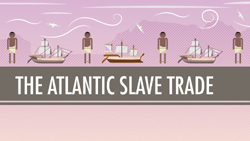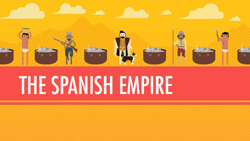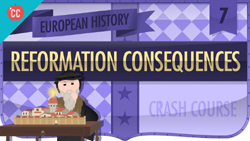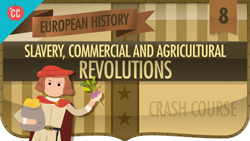 |
|
|
| Once you cover the basics, here
are some videos that will deepen your understanding. |
|
On YouTube |
|
|
|
|
|
|
|
|
Concurrent World History |
|
 |
|
Crash
Course World History #24:
The
Atlantic Slave Trade |
|
In which John Green teaches
you about one of the least funny subjects in history: slavery. John investigates
when and where slavery originated, how it changed over the centuries, and
how Europeans and colonists in the Americas arrived at the idea that people
could own other people based on skin color.
Slavery has existed as long
as humans have had civilization, but the Atlantic Slave Trade was the height,
or depth, of dehumanizing, brutal, chattel slavery. American slavery ended
less than 150 years ago. In some parts of the world, it is still going
on. So how do we reconcile that with modern life? In a desperate attempt
at comic relief, Boba Fett makes an appearance. |
|
|
|
 |
|
Crash
Course World History #25:
The
Spanish Empire, Silver, & Runaway Inflation |
|
In which John Green explores
how Spain went from being a middling European power to one of the most
powerful empires on Earth, thanks to their plunder of the New World in
the 16th and 17th centuries. Learn how Spain managed to destroy the two
biggest pre-Columbian civilizations, mine a mountain made of silver, mishandle
their economy, and lose it all by the mid-1700s. Come along for the roller
coaster ride with Charles I (he was also Charles V), Philip II, Atahualpa,
Moctezuma, Hernán Cortés, and Francisco Pizarro as Spain
rises and falls, and takes two empires and China down with them. |
|
|
|
 |
|
Crash
Course European History #7:
Reformation
and Consequences |
|
The Protestant Reformation
didn't exactly begin with Martin Luther, and it didn't end with him either.
Reformers and monarchs changed the ways that religious and state power
were organized throughout the 16th and early 17th centuries. Jean Calvin
in France and Switzerland, the Tudors in England, and the Hugenots in France
also made major contributions to the Reformation. |
|
|
|
 |
|
Crash
Course European History #8:
Commerce,
Agriculture, and Slavery |
|
We've been talking a lot
about kings, and queens, and wars, and religious upheaval for most of this
series, but let's take a moment to zoom out, and look at the ways that
individuals' lives were changing in the time span we've covered so far.
Some people's lives were improving, thanks to innovations in agriculture
and commerce, and the technologies that drove those fields. Lots of people's
lives were also getting worse during this time, thanks to the expansion
of the Atlantic slave trade. And these two shifts were definitely intertwined. |
|
|
|
|
|
Goals &
Objectives
of the Crash Course videos:
By the end of the course,
you will be able to:
*Identify and explain historical
developments and processes
*Analyze the context of
historical events, developments, and processes and explain how they are
situated within a broader historical context
*Explain the importance
of point of view, historical situation, and audience of a source
*Analyze patterns and connections
among historical developments and processes, both laterally and chronologically
through history
*Be a more informed citizen
of the world |
The
Beatles |
|
|
|


